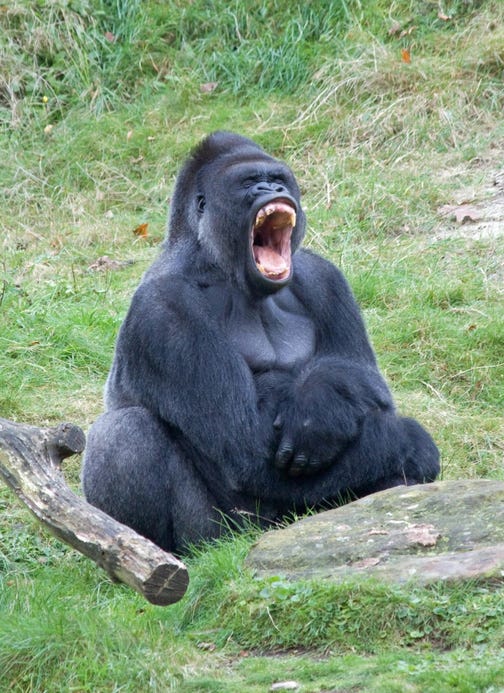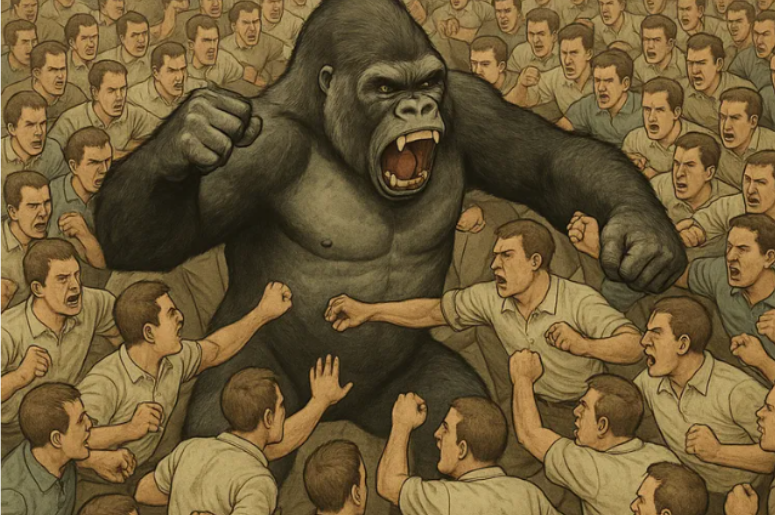
From Twitter threads to TikTok challenges, a peculiar question has taken the internet by storm: "Could 100 average men beat a silverback gorilla in a fight?" What began as a hypothetical debate among online communities has grown into a cultural phenomenon, sparking memes, parody videos, and heated discussions across social media platforms.
The question, absurd on its surface, taps into the human fascination with strength, strategy, and teamwork. Advocates for the "100 men" argue that sheer numbers could triumph over the raw power of a 400-pound, muscle-bound gorilla. Skeptics, however, emphasize the gorilla's unmatched strength, agility, and natural weaponry, such as powerful jaws and sharp canines. Some users have even enlisted experts—biologists, animal behaviorists, and martial artists—to weigh in, often with hilarious or eye-opening results.

“I can’t believe I’ve spent an hour researching gorilla bite force because of a meme,” tweeted one user, accompanied by a graph of comparative animal strengths. Another popular post humorously breaks down the hypothetical “recruitment pool,” pointing out how many "average" men would likely be out of shape, elderly, or otherwise unfit for the challenge.
The meme has inspired creative offshoots, including fake battle simulations, comic sketches, and even merchandise like “Team 100 Men vs. Team Gorilla” T-shirts. TikTok has seen users choreograph mock battle scenes, adding dramatic soundtracks to ridiculous standoffs between "100 men" represented by stick figures and CGI gorillas.
Experts in internet culture suggest that the meme's longevity lies in its blend of humor and relatability. Dr. Alex Reed, a professor of media studies at the University of Texas at Austin, explains, “This meme works because it’s ridiculous yet strangely compelling. It makes people think about human limitations, teamwork, and our relationship with nature—all wrapped up in a funny and harmless package.”
While most participants recognize the humor, some animal advocacy groups have used the meme as an opportunity to educate the public about gorillas, emphasizing their endangered status and need for conservation efforts.
As the meme continues to spread, one thing is clear: it has united people across the internet, not in a battle against gorillas, but in shared laughter and creativity. Whether you're on "Team Men" or "Team Gorilla," this viral sensation has become a roaring reminder of the internet's power to turn the bizarre into the unforgettable.
Let’s break down the hypothetical group of 100 "average" men in the U.S. based on physical characteristics and limitations:
Obese: Approximately 41.6% of men are obese. In a group of 100, this would mean 42 men are obese.
Handicapped: About 12.2% of men have mobility disabilities, which translates to 12 men in this group. Other disabilities, such as cognitive or self-care difficulties, could add to this number.
Too Old to Fight: Men aged 65 and older make up 16.9% of the population. In this group, 17 men would likely fall into this category, with many experiencing age-related health issues or reduced physical capabilities.
Physically Fit: Only 24.2% of men meet federal guidelines for both aerobic and muscle-strengthening activities. This means 24 men might be physically prepared for such a challenge.
Other Factors: Additional considerations, such as chronic illnesses or lack of coordination, could further reduce the number of men capable of engaging in such a hypothetical scenario.
LISTEN on the Audacy App
Tell your Smart Speaker to "PLAY 1080 KRLD"
Sign Up to receive our KRLD Insider Newsletter for more news
Follow us on Facebook | Twitter | Instagram | YouTube
